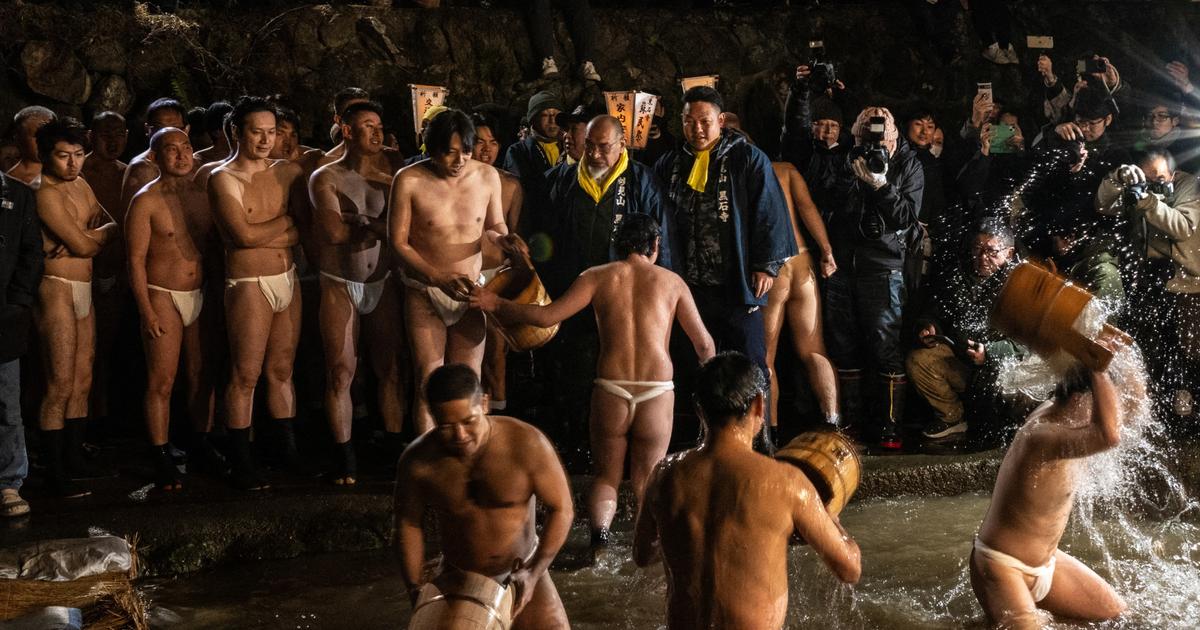Intense white steam rises as hundreds of men dressed in light loincloths purify themselves in cold water and compete for talismans: this centuries-old ritual in northern Japan was held for the very last time on February 17.
The passionate chants of
“jasso, joyasa”
(
“correct and remove evil”
) will no longer resonate as they echoed for hours Saturday evening in this cedar forest in the Iwate region of eastern Japan.
The isolated temple of Kokuseki hosted a final time this popular annual rite, more than 1,000 years old according to legend.
Organizing the event, which attracted hundreds of participants and thousands of tourists each year, became too much for the often graying-haired monks and devotees of Oshu and its region.
The “Sominsai”
festival
, considered one of the most unique in Japan, is the latest victim of the demographic crisis which is hitting rural communities hard.
“It is very difficult to organize a festival of this scale
,” explains monk Daigo Fujinami in front of the temple which opened its doors in 729.
“There are so many people and it is motivating.
But behind the scenes, there is so much work to be done.
I cannot be blind to this reality
,” the religious still regrets.
Also read: Kazuo Inamori, legendary patron and Buddhist monk
A dying tradition
Japan is seeing its population age faster than most other countries, with a third of its residents aged 65 and over.
A large number of schools, shops and transport services have had to close, particularly in small towns and villages.
Fortunately for this country of tradition, other temples across Japan still host similar festivals where, for example, men in loincloths bathe in icy water or honor their deities by competing for talismans.
Some festivals are adapting in order to continue to exist, in particular by allowing women to attend ceremonies previously reserved for men.
The coronavirus had already forced Oshu organizers to curtail prayer ceremonies and practice more modest rituals.
On Saturday evening, this latest edition of the festival ended around 11 p.m., but it attracted a crowd rarely seen in the memory of participants and observers.
At sunset, men dressed in white loincloths come out to the temple on a mountain slope.
They bathe in an icy stream and walk around the temple as the winter breeze blows.
They clench their fists to endure the cold and shout
“jasso joyasa”
.
Some of them immortalize these moments with their cameras.
The crowd follows the men as they climb the stone steps of the temple and stroll along the dirt roads.
The meeting reached its most powerful moment when hundreds
of "naked men"
gathered inside the wooden temple building to shout, chant and sometimes jostle in the tumult for talismans for more than one hour.
Toshiaki Kikuchi, a resident of the region, wants to believe in the return of these men in loincloths and this crowd.
He helped the temple and organized the festival for years.
“Even in a different format, I hope that this tradition will be maintained
,” he still hoped at the end of the evening.
Many participants or simple observers expressed both their sadness and their incomprehension at the disappearance of the festival.
“This is the last edition of this great festival which has lasted for 1,000 years.
I really wanted to participate
,” said Yasuo Nishimura, 49, a geriatric caregiver from a region west of Osaka, more than ten hours away.
He observes that there is a lack of young people to take over in order to keep the
“naked men”
festival alive .
Next year, Daigo Fujinami and the other monks at the temple will replace this festival with prayer ceremonies and find other ways to continue these spiritual practices.
But from now on the loincloths will remain in the wardrobes and the
“jasso, joyasa”
will be, forever, silent.

